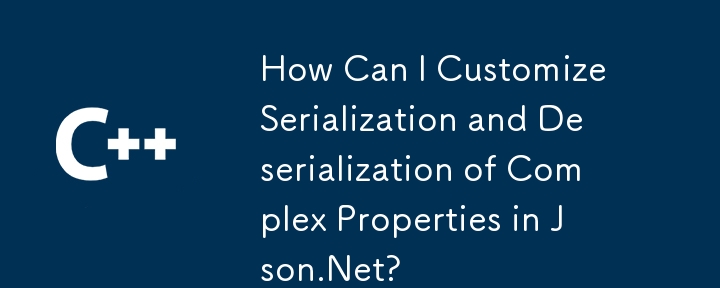

Custom Serialization and Deserialization of Complex Properties in Json.Net
The default behavior of Json.Net serializes complex properties as separate objects within the JSON representation. However, in certain scenarios, such as when representing a property with a single value, this behavior may be undesirable.
To achieve a more streamlined JSON representation, we can implement custom TypeConverters or JsonConverters.
TypeConverter Approach
Json.Net can utilize TypeConverters to handle custom serialization/deserialization. For example, the StringId class can be converted to and from JSON using a custom StringIdConverter:
[TypeConverter(typeof(StringIdConverter))]
class StringId
{
public string Value { get; set; }
}
class StringIdConverter : TypeConverter
{
// ... (implementation details for type conversion)
}JsonConverter Approach
Alternatively, if adding Json.Net-specific attributes is acceptable, a custom JsonConverter can be used:
[JsonConverter(typeof(StringIdConverter))]
class StringId
{
public string Value { get; set; }
}
class StringIdConverter : JsonConverter
{
// ... (implementation details for JSON conversion)
}By applying these custom converters, the JSON representation of the Car class can be transformed into the desired format:
{ "Id": "someId", "Name": "Ford" }Considerations
When using converters, it's essential to handle culture-specific conversions carefully to ensure portability across different environments.
Additionally, support for TypeConverters varies depending on the version and platform used (e.g. .Net Core vs Portable). Therefore, it's recommended to refer to the official Json.Net documentation for specific implementation details and compatibility information.
The above is the detailed content of How Can I Customize Serialization and Deserialization of Complex Properties in Json.Net?. For more information, please follow other related articles on the PHP Chinese website!




